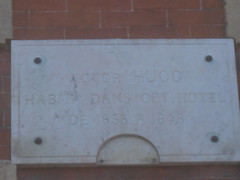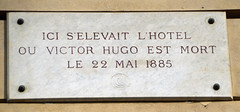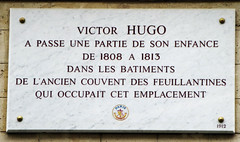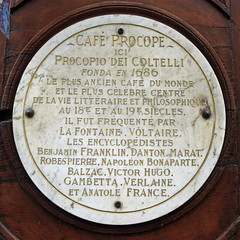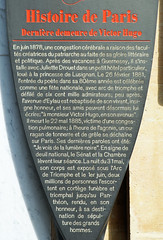Victor Hugo
Commemorated on 9 plaques
Victor Hugo habita dans cet hotel de 1833 a 1848
English translation: Victor Hugo lived in this hotel 1833-1848
6 Places Des Vosges, Paris, France where they lived (1833-1848)
Ici s'elevait l'hotel ou Victor Hugo est mort le 22 Mai 1885
English translation: Here stood the hotel where Victor Hugo died May 22 1885
124, Avenue Victor-Hugo, Paris, France where they died (1885)
Victor Hugo a passe une partie de son enfance de 1808 a 1813 dans les batiments de l'ancien Couvent des Feuillantines qui occupait cet emplacement
English translation: Victor Hugo spent part of his childhood in 1808-1813 in the buildings of the former Convent of Feuillantines that occupied this location
8 rue des Feuillantines, Paris, France where they lived (1808-1813)
Café Procope. Ici Procopio dei Coltelli fonda en 1686 le plus ancien café du monde et le plus célèbre centre de la vie littéraire et philosophique au 18e et au 19e siècles. Il fut fréquenté par La Fontaine, Voltaire, les Encyclopédistes, Benjamin Franklin, Danton, Marat, Robespierre, Napoléon Bonaparte, Balzac, Victor Hugo, Gambetta, Verlaine et Anatole France.
English translation: Café Procope. Here Procopio dei Coltelli founded in 1686 the oldest café in the world and the most famous center of philosophical and literary life in the 18th and 19th centuries. It was visited by La Fontaine, Voltaire, Les Encyclopédistes, Benjamin Franklin, Danton, Marat, Robespierre, Napoléon Bonaparte, Balzac, Victor Hugo, Gambetta, Verlaine and Anatole France.
13 rue de l'Ancienne Comédie, Paris, France where they visited
Dernière demeure de Victor Hugo. En juin 1878, une congestion cérébrale a raison des facultés créatrices du patriarche au faite de sa gloire littéraire et politique. Après des vacances à Guernesey, il s'installe avec Juliette Drouet dans un petit hôtel particulier, loué à la princesse de Lusignan. Le 26 février 1881, l'entrée du poète dans sa 80ème année est célébrée comme une fête nationale, avec arc de triomphe et défilé de six cent mille admirateurs; peu après, l'avenue d'Eylau est rebaptisée de son vivant, insigne honneur, et ses amis peuvent désormais lui écrire: "à monsieur Victor Hugo, en son avenue". Il meurt le 22 mai 1885, victime d'une congestion pulmonaire; à l'heur de l'agonie, un ouragan de tonnerre et de grêle se déchaîne sur Paris. Ses dernières paroles ont été: "Je vois de la lumière noire". En signe de deuil national, le Sénat et la Chambre lèvent leur séance. La nuit du 31 mai, son corps est exposé sous l'Arc de Triomphe et le 1er juin, deux millions de personnes l'escortent en cortège funèbre et triomphal jusqu'au Panthéon, rendu, en son honneur, à sa destination de sépulture des grands hommes.
English translation: Last home of Victor Hugo. In June 1878, a cerebral congestion defeated the creative faculties of the patriarch at the height of his literary and political glory. After a holiday in Guernsey, he moved with Juliette Drouet to a small mansion, rented to the Princess of Lusignan. On February 26, 1881, the entry of the poet in his 80th year is celebrated as a national holiday, with a triumphal arch and a parade of six hundred thousand admirers; soon afterwards, the avenue d'Eylau is renamed during his lifetime, a badge of honour, and his friends can now write to him: "to Monsieur Victor Hugo, in his avenue". He died on May 22, 1885, suffering from pulmonary congestion; at the hour of agony, a hurricane of thunder and hail was unleashed on Paris. His last words were: "I see black light". As a sign of national mourning, the Senate and the House adjourned. The night of May 31, his body was displayed under the Arc de Triomphe and June 1, two million people escorted him in a funeral procession and triumphal to the Pantheon, returned, in his honor, to his burial destination of great men.
124 avenue Victor Hugo, Paris, France where they lived (1878-1885)
Victor Hugo a habite cette maison en 1852
English translation:
Grote Markt 26-27, Brussels, Belgium where they lived (1852)
Hauteville - House Maison d'exil de Victor Hugo 1856-1870 a été offerte à la ville de Paris par Jeanne Hugo et les enfants de Georges Hugo en MCMXXVII.
English translation: Hauteville House. Victor Hugo's House of Exile 1856-1870 was donated to the city of Paris by Jeanne Hugo and the children of Georges Hugo in MCMXXVII.
38 rue Hauteville, St. Peter Port, Guernsey where they lived
Victor Hugo French Poet, Playwright and Author stayed at the Pomme d'Or Hotel on his arrival in Jersey 5th August 1852
Liberation Square, St. Helier, Jersey where they stayed (1852)
"Hauteville Fairy" Première maison de Victor Hugo à Guernesey de 1855 à 1856 et demeure de Juliette Drouet à partir de 1864.
English translation: "Hauteville Fairy" First house of Victor Hugo in Guernsey from 1855 to 1856 and home of Juliette Drouet from 1864.
20 rue Hauteville, St. Peter Port, Guernsey where they lived (1855-1856)


